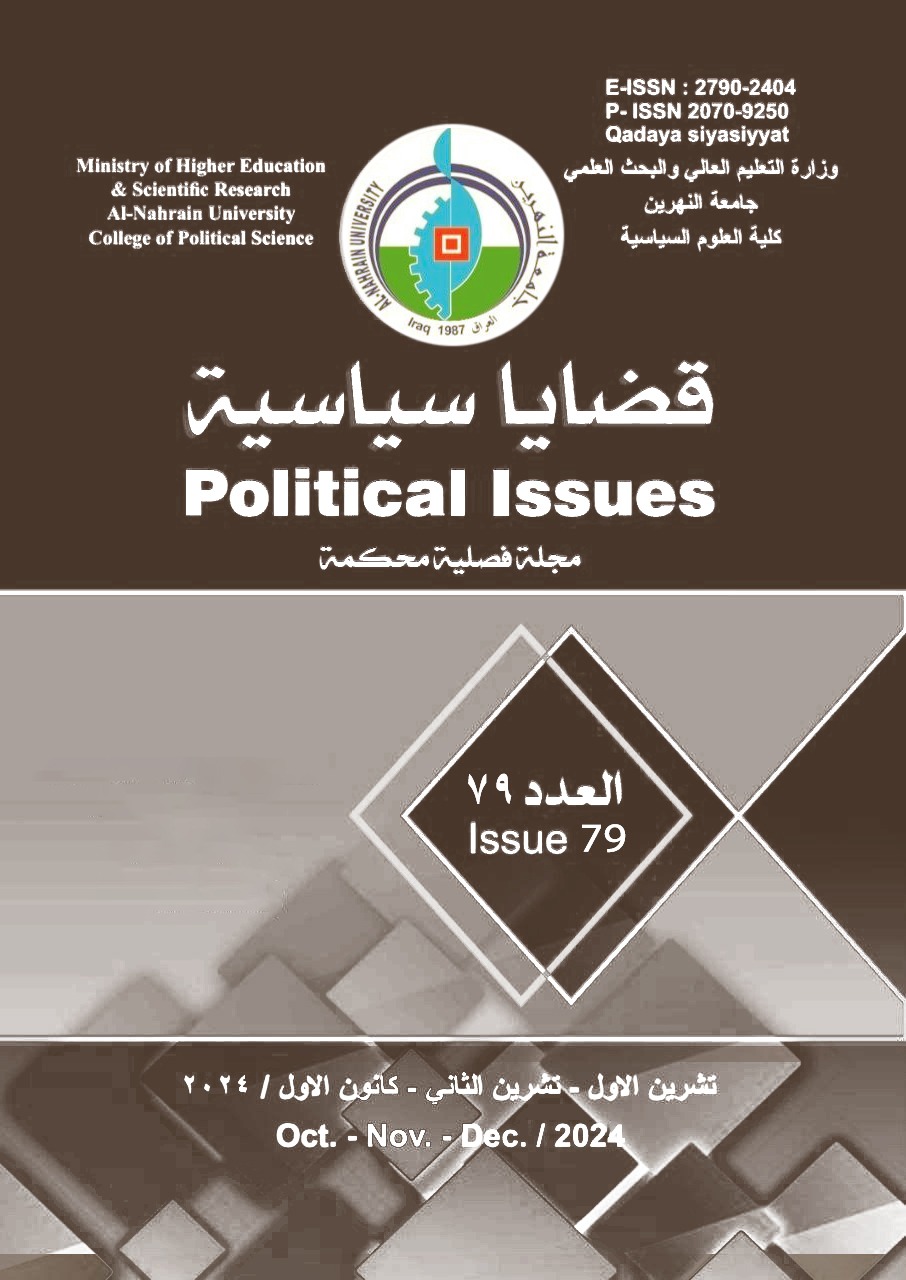Understanding Terrorist Radicalization and Extremism: Building Sustainable Recovery Strategies from Terrorism
DOI:
https://doi.org/10.58298/792024653Keywords:
radical, extremism, terrorism, violent, strategies, recovery, sustainableAbstract
Combating terrorism and extremism requires significant efforts from all segments of society, including governments, local communities, and international entities, to ensure sustainable recovery, and in return there is no coordination between the international community to establish a system to confront it effectively and permanently. Steady approaches are being taken, and its devastating effects on lives, facilities and others are no longer hidden, until it comes to the point of threatening the economic, social and political conditions of countries. Among the challenges, developments and rapid and comprehensive events in all aspects of life, like many countries of the world, and among these challenges that have emerged in the past two decades is the phenomenon of terrorism, extremism and intellectual deviation, which is basically a departure from the approach of moderation, moderation and tolerance, and since terrorism has turned into a phenomenon Efforts should be devoted to researching the causes of this dangerous scourge and developing solutions and policies to combat it, confront it by various means, and achieve sustainable recovery from it. This is done by presenting the subject through the following axes. Conceptual rooting of the terms (terrorism, violent extremism and terrorist radicalism) the most important strategies for recovery from terrorism.
References
Majd al-Din Muhammad ibn Yaqub al-Fayruzabadi, Al-Qamus al-Muhit - Al-Risala Foundation - Beirut, 2nd edition, Chapter B, Section R - 1987 AD
Masoud Gibran, “Al-Raed, a Modern Linguistic Dictionary”, Dar al-Ilm Lil-Malayin, 1st edition - Beirut, 1997 AD
Imam Hassanein Atta, Terrorism, the Legal Structure of Crime, Dar al-Matbouat al-Jami’iyyah and Cairo, 2009.
Amal al-Yaziji and Dr. Muhammad Aziz Shukri, “International Terrorism and the Current World Order”, Dar al-Fikr al-Mu’asir, Beirut and Damascus, 1st edition, 2002 AD.
Andrew Silk, How to Become a Terrorist, Terrorists, Victims and Society: Psychological Dimensions of Terrorism and Its Influences, Andrew Silk Publishing House, Hoboken Garzie, New York, 2003.
Hassanein Al-Mohammadi Bawadi, The Security System in Confronting Terrorism: New Methods for Confronting Terrorism, Dar Al-Fikr, Alexandria, 2007.
Hussein Sharif, International Terrorism and Its Implications for the Middle East, Egyptian Book Organization, Cairo, 1997.
Gamal Abdel-Khader Abdel-Rahim, Combating Money Laundering and Financing Terrorism in the Arab Gulf States and the Middle East and the Conflict of Laws and Interests with the West, Volume 2, Dar Al-Mahjah Al-Bayda, 2004.
Haitham Faleh Shihab, The Crime of Terrorism and Ways to Combat It in Comparative Penal Legislation, Dar Al-Thaqafa, 2010.
Shaza Abboudi Abbas, Mechanisms for Combating Terrorism and Their Impact on Human Rights, Unpublished Master’s Thesis, Faculty of Law, University of Kufa, 2012.
Tahseen Muhammad Anis Shradqa, The Role of the Media in Combating the Phenomenon of Terrorism and Extremism, a working paper submitted to the refereed international conference entitled: The Role of Sharia, Law and Media in Combating Terrorism under the Slogan: A World Without Terrorism, Zarqa University - Jordan, 2016.
Saad Ali Al-Shahrani, Financing Terrorism, Arab Journal of Security Studies and Training, Issue 49, Naif Arab University for Security Sciences, Riyadh, 2009.
Ansam Faeq Abdul Razzaq Al-Ubaidi, The Phenomenon of Terrorism between Reality and Proposed Solutions, Political Issues Magazine, Issue (62), College of Political Science, Al-Nahrain University, 2020.
Fouad Allam, Terrorism: Causes of its Spread and Means of Combating it, a study in the book The Security System in the Arabian Gulf Region, Internal and External Challenges, Emirates Center for Strategic Studies and Research, Abu Dhabi, 2008.
Ronald Crelinstein, Combating Terrorism, Translated Studies No. 44, Translated by: Ahmed Al-Tijani, Emirates Center for Strategic Studies and Research, Abu Dhabi, 2011.
Ahmed Falah Al-Amoush, Causes of the Spread of the Terrorism Phenomenon, a study presented to the Terrorism and Globalization Symposium, Naif Arab University for Security Sciences, Riyadh, 2004.
Abdullah Al-Yousef, Youth and Deviance, Police Thought Magazine, Volume 13, Issue 15, 2004, p. 32, also see: Abdulrahman Asiri and Ali Al-Janahi, Intellectual Deviation and Its Impact on National Security in the GCC Countries, an unpublished study presented to the General Secretariat of the Cooperation Council, Riyadh, 2006.
Muhammad Al-Amin Al-Bishri, International Cooperation in Combating Terrorism: Frameworks and Mechanisms, Vol. 19, Arab Journal of Security Studies and Training, Riyadh, 4 2004.
Additional Files
Published
Issue
Section
License
Copyright (c) 2024 أيمن رزاق هادي، أحمد دعيس حسين، ندى أحمد موسى

This work is licensed under a Creative Commons Attribution 4.0 International License.
This is an Open Access article distributed under the terms of the creative commons attribution (CC BY) 4.0 international license which permits unrestricted use, distribution, and reproduction in any medium or format, and to alter, transform, or build upon the material, including for commercial use, providing the original author is credited.






